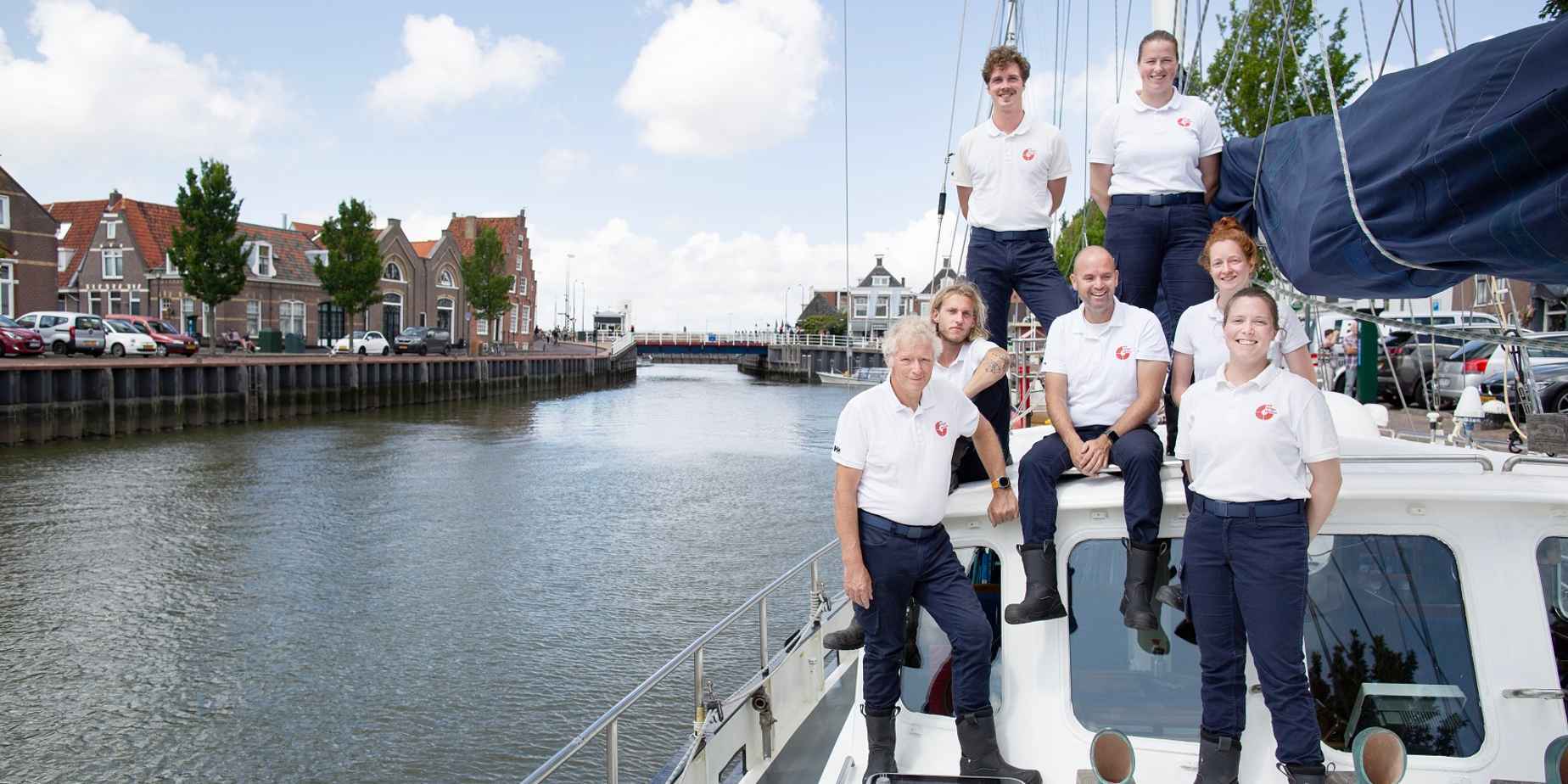At a shipyard near the Port of Rotterdam, Sea Ranger Service is working on a new ship diligently. The hull is already there and the engine is in. The masts will follow in the fall. "In 2024 two of our ships will be sailing the North Sea," says Wietse van der Werf, founder and director of the Sea Ranger Service. "And we are expanding to France and England." The ships stand out not only because they mainly sail - and thus run cleaner and cheaper - but also because of their unusual mission.
On board, you can see young people taking water samples to measure plastic pollution, doing climate measurements for KNMI (the Royal Dutch Meteorological Institute) and planting seagrass. But they also take along inspection services so they can use drones to check whether containers on cargo ships are properly secured. No unnecessary luxury, if you think back to all the shoes washed ashore from the MSC Zoe disaster. The Sea Rangers themselves also watch for irregularities - illegal salvaging of wrecks, illegal fishing, ships dumping waste - and then alert government agencies.
Bootcamp with veterans
The young people (ages 18-29) completed a two-week bootcamp on land and sea led by former military personnel. Wietse: "Can you work in a team, how do you perform under pressure, do you get seasick?" After that, a selection goes to work on one of the ships for about a year on a paid basis. No study or prior training is necessary; you learn everything on board. So far, 120 young people have completed the bootcamp, 30 of whom have been employed. Half of all participants have gone on to maritime jobs. "A good Sea Ranger is above all motivated," says Wietse. "It must suit you to work together on a small ship for 2 weeks, and then be home for 2 weeks. You have to be somewhat fit, but you don't have to be physically strong. You do have to be resilient. Fortunately, the sea works mediatively."
Especially the planting of seagrass excites Wietse. "We are doing that in the Oosterschelde (estuary in the province of Zeeland), in collaboration with the University of Groningen. Seagrass absorbs CO2, filters water and provides a breeding ground for fish, but it has mostly disappeared. We are helping the university scale up their research into successful replanting." A nice side effect: it makes conservation less abstract and academic. "It's very cool to see Sea Rangers walking along the coast with buckets and simply bringing nature back. It makes very tangible how you can create jobs by protecting nature. I don't have to explain anything to politicians or governments anymore when I show it, everyone understands. It makes marine protection accessible, something everyone can get behind."
Pollution in Antarctica
For Wietse, protecting nature has always been a no-brainer. "Since I became a youth nature guard in Utrecht as a 9-year-old, indirectly I've always been involved with it." After his education, he became a ship carpenter, later working in the engine room. Jobs on research ships led him to Antarctica several times.
"I saw incredibly beautiful places. But even in protected marine areas, there was still pollution and illegal fishing. It's crazy: 7% of the sea surface is protected, and by 2030 it should be 30%. But in only 0.6% of the areas do governments have enough capacity to really protect. That stung me a lot."
At the same time, on his sea voyages, Wietse sees a lot of youth unemployment in port areas. Couldn't these two problems be each other's solutions? When he visits an exhibition, the penny drops. "Somewhere tucked away in a corner was a sign about the Civilian Conservation Corps. President Roosevelt put millions of men to work during the Great Depression by having them create and manage national parks. I thought: that is exactly what we are not doing right now: restoring nature by creating jobs and training young people. Sometimes it's not about technical gimmicks, but the answers for the future lie in the past."
Affordable wildlife management
Sea Ranger Service exists for 7 years now, and has been sailing at sea for 5 years. Before that, this work did not exist, Wietse emphasizes. "There are no international foresters of the sea. Of course, there are environmental organizations and governments active at sea, but a social enterprise sailing on behalf of the government is new. We have carried out 13 government contracts so far, and 11 of them had never been outsourced before. Because we can sail relatively cheaply, all kinds of research and nature management is now possible that was previously too expensive, including for governments. I am proud that we have gained that trust."
Working with young people also makes him proud. "You see them change as a person. Some come from a difficult situation and make a huge leap in their career path here. You give young people who care about nature a chance to educate themselves in it and make it their job. We've never had to advertise to get our bootcamps full."
Wietse himself still sails along on occasion. But after his years in the engine room, these days he is mostly in meeting rooms. "My role now is to organize this well on land and do everything necessary to build this up. Eventually we want to go to India, South Africa, the US..." It will take a few more years, but it will succeed. Wietse, soberly: "The earth needs it."







